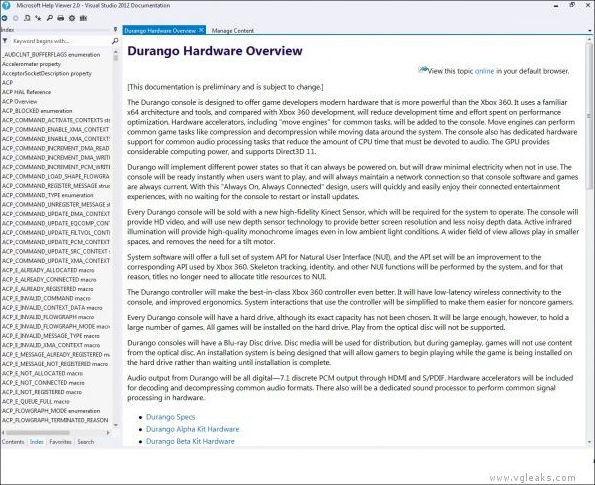http://www.infowars.com/new-xbox-wont-let-you-play-unless-its-spying-on-you/
Adan Salazar
People throughout the world could soon be voluntarily outfitting their homes with indefinitely active cameras, infrared sensors and microphones if they purchase Microsoft’s new Xbox video game console, slated for release sometime next year.
According to leaked screen captures, the new console, codenamed “Durango,” will be “Always On, Always Connected,” meaning it will require a perpetual Internet connection, in addition to a new high-fidelity Kinect Sensor, “which will be required for the system to operate,” representing a huge win for Big Brother in infiltrating homes across the across the world under the guise of trendiness.
Being touted as a measure to ensure “software and games are always current,” the new Xbox will not allow users to play games unless a permanent Internet connection is established, according to leaked screenshots obtained by the website Vgleaks.

Screenshot via VGleaks.com
“Durango will implement different power states so that it can always be powered on, but will draw minimal electricity when not in use,” the grainy, leaked screenshot states, adding, “The console will be ready instantly when users want to play, and will always maintain a network connection so that software and games are always current. With this ‘Always On, Always Connected’ design, users will quickly and easily enjoy their connected entertainment experiences, with no waiting for the console to restart or install updates.”
“Durango would require a permanent internet connection,” writes Vgleaks. [emphasis theirs] “Yes, if you want to play a single adventure, you would have to be online. Whatever you will play, you must be online. Take the time machine and come back 3 years ago to erase the responsible person.” [emphasis ours]
Likewise, the new system reportedly will not “operate” unless “a new high-fidelity Kinect Sensor” is attached, which will reportedly be sold with the console, granting the new Xbox eerie Big Brother-like powers.
As the current Xbox 360 Kinect device is already equipped with motion sensors, infrared sensors (enabling it to map out environments – like your room – and detect different faces), a multi-array microphone (capable of distinguishing different voices) and a 640×480 pixel VGA camera (enabling it to see as we do), we can expect the next Kinect’s technology to be exponentially more intricate and dangerous.
These additional nuances might be argued as expected and even necessary in the Internet age we live in, where everything from dishwashers to refrigerators are connected, but Microsoft also recently applied for patents that could take information obtained to a frighteningly new Orwellian level.
The website Beta Beat reported last year that “Back in 2011, Microsoft applied for a patent that would allow cameras and sensors, much like the ones embedded in the Kinect, to track how many people are in a room. Developed by Microsoft’s ‘incubation team,’ which is where they test new approaches to hardware, the patent was recently made public. They’re calling the invention a ‘consumer detector’ and it’s just as frightening as it sounds.”
Beta Beat goes on, “Once it has identified how many people are there–and even who is there–the device will charge for content accordingly. If you pay for one content license but then more viewers join the room, it could halt playback and request that you pay for a different license. That means if you plan to have a movie marathon sleepover, Microsoft would like to charge you extra copyright money for the pleasure of snuggling and watching horror movies.”
In response to a Wall Street Journal article titled, “Is Your Videogame Machine Watching You?” Microsoft issued a statement regarding privacy and Xbox: “Xbox 360 and Xbox LIVE do not use any information captured by Kinect for advertising targeting purposes. Microsoft has a strong track record of implementing some of the best privacy protection measures in the industry. We place great importance on the privacy of our customers’ information and the safety of their experiences.”
While Microsoft’s response attempts to quell our concerns about privacy, it does not address the fact that Microsoft can, and most likely will, be spying on its customers, regardless of whether or not they are selling consumer information to advertisers.
It was also revealed, in March 2012, that a company called Obscure Technologies was working alongside the U.S. Navy to develop “computer forensic tools capable of hacking such consoles.”
“Such tools are expected to be made for the Department of Homeland Security Science and Technology Directorate — and there’s no particular mention of what Homeland Security might want with them,” reported Live Science last year.
We also saw Xbox cozy up to the U.S. government this past election cycle when Xbox allowed users to stream a presidential debate through their consoles, and then later polled users with questions regarding the debate.
“I think Bill Gates is about to kill his gaming platform,” states C.J.Oden, producer for the Alex Jones Show and a former-avid gamer. “It’s cyber espionage of everyone in America gullible enough to buy a system.”
Wikipedia claims, “The Kinect claimed the Guinness World Record of being the ‘fastest selling consumer electronics device’ after selling a total of 8 million units in its first 60 days.”
Indeed, if previous sales are any indicator, the new Xbox and its high-fidelity Kinect device, with powers disturbingly similar to “telescreens” out of George Orwell’s novel 1984, will soon be infiltrating millions of homes across the globe with little to no resistance.
No hay comentarios:
Publicar un comentario